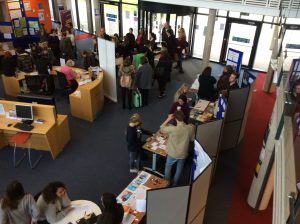By Gabrielle Reid, Estelle Kessi and Helen Johnson

After weeks of planning, third year Psychology students immersed themselves into their role as Community Psychologists on 23rd November, with the aim of creating social change through action in a Day of Social Justice. The idea was first implemented by Liz Cunningham, when she taught at the University, and it has now become an annual event on the Critical Community Psychology module.
The Checkland Foyer on Falmer Campus was transformed, with students fervently spreading awareness of social injustices ranging from single parent incomes to homeless women’s access to sanitary items. Each group communicated unique issues that often get overlooked within society, forming specific end-goals such as sharing knowledge, setting initiatives or advocating a change in policies. Eye-catching posters, short-films and petitions were all used to engage our student community into helping raise awareness of these causes and giving an insight into the lives of those marginalized. As Community Psychologists we also articulated our issues critically, highlighting how specific communities are disempowered, dismantling the dominant ideologies and bringing the issue to the forefront of the listener’s mind.

Myths Surrounding Refugees: Gabrielle Reid
My group and I chose to focus on the myths surrounding refugees. We saw this as a current issue in need of attention, due to the ways in which the media and politicians stereotype refugees, and the way this can shape public opinion of refugees. The influence of media outlets and politicians often causes the public to forget that refugees are often fleeing war, political turmoil or natural disasters.
We used the day of social justice to challenge university students’ and staff’s beliefs about refugees using factual quizzes, videos and passages detailing refugees’ stories. On average, people scored just over 50% on the quiz; this helped to show that preconceptions they held about refugees weren’t necessarily true.
To bring about to social change as a university, we asked people who approached our stall to write a supportive message to refugees who had just come to the UK. These messages were then compiled into an email and sent to refugee action (an organisation that helps refugees settle into life in the UK). In sending these messages we hope that we can make refugees feel less marginalised and more welcome in such unfamiliar environment.
Below are links to Refugee Action’s website where you can also post messages of support to refugees and a link to the quiz to test your knowledge:
Refugee action: http://www.refugee-action.org.uk/campaigns/welcome_a_refugee/
Refugee quiz: https://www.qzzr.com/c/quiz/288030/refugee
All in all we were pleased by how open minded and keen to learn everyone we met during the day of social justice was. We had many interesting conversations on top of this everyone we spoke to was incredibly supportive.

We asked staff and students who attended the Day of Social Justice for their feedback. Here are some of the things they said:
“A really good idea and something I would have loved to do myself when at university … It was great to see students raising awareness for topics that mattered to them and this really came across when you spoke to them…” ~ Ciara McDermott
“I was really impressed that the actions imagined were realistic and direct … I also noted the nuance with which issues were presented and discussed, showing a good understanding that only strengthened their position/point.” ~ Ceri Davies
What a rewarding and enlightening day it was, not only because we were tackling issues of injustices but also through learning how powerful and effective our voices can be.


Published by